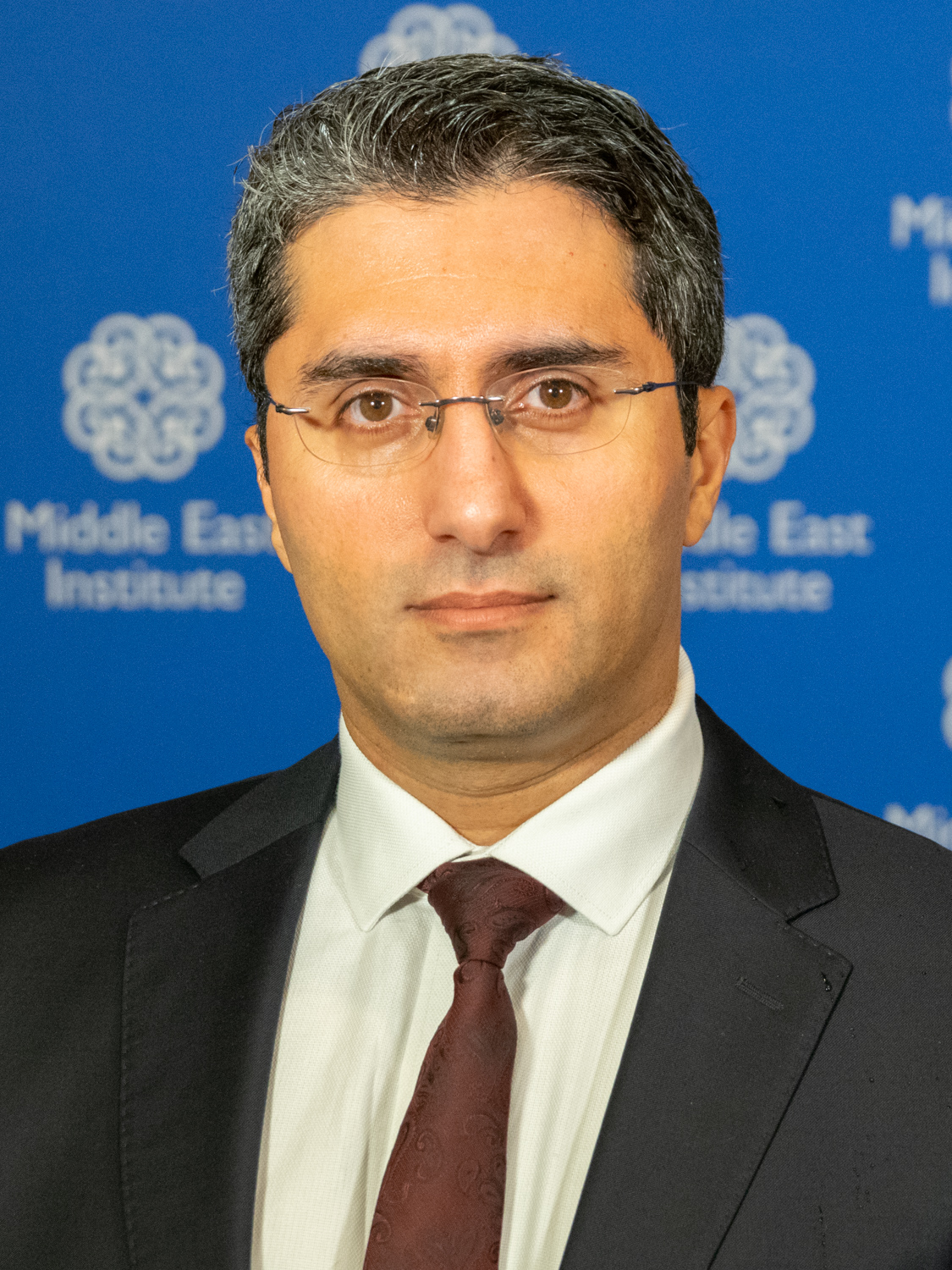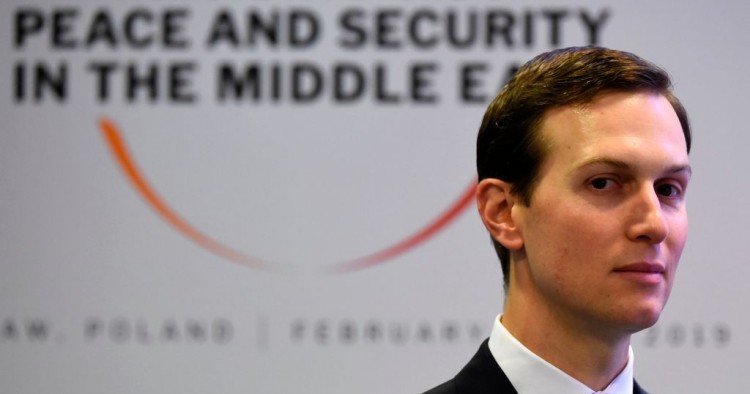In this week's Monday Briefing, MEI experts Gerald Feierstein, Guney Yildiz, Nathan Stock, Elizabeth Dent, and Eran Etzion provide analysis on recent and upcoming events including this week's Bahrain "workshop" on Palestine's economic development, an opposition victory in Istanbul's rerun election, the release of a portion of the Trump administration's Israel-Palestine peace plan, the fracturing of the Global Coalition to Defeat ISIS, and Tuesday's trilateral meeting between the U.S., Israel, and Russia.
Bahrain workshop is little more than a kabuki show
Gerald Feierstein
Senior Vice President

An uncertain number of investors, business leaders, and government officials will gather in Manama this week for a “workshop” and to hear Jared Kushner outline a vision for economic development in Palestine and its neighbors. By Kushner’s own definition, the meeting will bring no tangible result. In comments to Reuters, he acknowledged that any movement on the economic plan will be contingent on the resolution of outstanding political issues, which will not be on the agenda in Manama. The absence of any significant Palestinian participation will reinforce the impression that the gathering is little more than a kabuki show.
Those attending the event are doing so for largely cynical reasons. The Trump administration is under pressure to show some result from the more than two years of work that Kushner and his team have supposedly invested in their “deal of the century.” Having backed away from the notion of tabling a political resolution, the economic white paper is a de minimis response to critics who question whether Kushner will ever produce anything at all.
The Gulf participants will also be there for reasons having little to do with Israeli-Palestinian peace. Some businesspeople will almost certainly see this as an opportunity to cash in on the proposed $50 billion windfall that Kushner has suggested. But the Gulf governments are motivated more by the need to curry favor with the Trump administration, and the desire to demonstrate support for Trump’s son-in-law on his favorite vanity project, than by any expectation that this will advance the cause of peace in the Middle East.
In sum, it’s likely that, after two days of sweaty rhetoric in Bahrain’s steamy capital, the participants will return to their normal affairs and the exercise will soon be consigned to the dustbin of history.
Opposition claims decisive win in Istanbul rerun
Guney Yildiz
Non-resident Scholar

It is harder for President Recep Tayyip Erdogan to recover from a double election defeat in Istanbul.
By rejecting the Justice and Development (AK) Party candidate in Istanbul, the Turkish electorate has sent three clear messages to President Erdogan.
The first one is that a significant portion of the electorate in Istanbul didn't think the decision to cancel the election was justified. The fact that the opposition consolidated its base and that there was a notable swing from the ruling AK Party to the main opposition Republican People’s Party (CHP) was a strong indication of this. The original election on March 31st was cancelled because the High Election Council ruled that some polling station officials were not appointed from among public officials, as required by law.
The Turkish electorate has also twice rejected how President Erdogan and his government are handling the country’s economic problems. Turkey has been facing a significant downturn, with forecasts suggesting the economy will contract in 2019 and a more prolonged recession lies ahead. President Erdogan’s foreign policy choices, which put Turkey increasingly at odds with the U.S. and Europe, have hit the value of the Turkish lira and exacerbated the problems on the economic front.
More importantly, the electorate also rejected political polarization. President Erdogan and his party’s discourse, especially before the original election at the end of March, was polarizing. Erdogan and the pro-government press relentlessly accused opposition parties of siding with terrorists. He basically said you are either with us or with those who conspire with the terrorists. President Erdogan put nationalism and largely anti-Kurdish rhetoric center stage and declared that the election was a matter of survival for Turkey.
President Erdogan adopted this approach because he thought he had a stronger hand running on the issues of security and nationalism, given the AK Party’s alliance with the ultranationalists of the Nationalist Action Party (MHP). Following the collapse of the peace process with the Kurdistan Workers’ Party (PKK) in 2015, President Erdogan veered sharply to the right, adopting a more anti-Kurdish discourse than even hard-line nationalist leaders. He didn't win all the nationalist votes by doing so, but he surely alienated the Kurds, who voted strongly for the opposition in Istanbul and beyond, thereby tipping the scales in its favor.
If the AK Party hadn’t pushed for the cancellation of the March election, it would have been easier to recover from a narrow defeat in Istanbul and several other major cities, including Ankara and Adana. Now, however, the ruling party is in a much weaker position.
Apart from the gains by the opposition, two former AK Party heavyweights, former Prime Minister Ahmet Davutoglu and former Economy Minister Ali Babacan, are leading efforts to set up new political parties that could further eat into President Erdogan’s base.
Trump administration releases Palestinian economic plan
Nathan Stock
MEI Scholar

On June 22, to little fanfare, the Trump administration released a portion of its Israeli-Palestinian peace plan. The document outlines a “vision” for the future of the Palestinian economy. It includes $50 billion in investment for the West Bank, Gaza, and the region, and boasts an array of projects — everything from an online “e-government” system for the Palestinian Authority to visions of 5G cellular access in Gaza. The plan was released in advance of a “workshop” on the Palestinian economy that the U.S. will host in Bahrain this week. The Palestinian leadership, which has been boycotting the Trump administration since its 2017 recognition of Jerusalem as Israel’s capital, rejected the proposal and will not be attending the event in Manama.
The economic plan has two chief flaws. First, it contains no specific commitments regarding who would foot the bill for the $50 billion. It would appear the U.S. will not be contributing. Former U.S. Ambassador to Israel Dan Shapiro has noted that “the Trump administration has shut down aid programs that support every one of the goals” in the document.
Second, the plan is written as though the West Bank and Gaza were already the independent State of Palestine — as opposed to an occupied territory under Israeli military control. Gaza is unlikely to see the proposed flood of tourists while it remains under Israeli blockade. West Bank Palestinians are unlikely to have their access to water doubled while the Oslo Accords continue to grant Israel full control of the aquifer.
In an interview on June 22nd, White House Senior Advisor Jared Kushner emphasized that the issuance of the administration’s political plan is “a separate topic” that does not hinge on the success of the economic plan. Be that as it may, any implementation of the administration’s economic “vision” would be entirely dependent on securing a viable peace agreement. Kushner told Reuters that the political portion of the plan — presumably the part where they explain how they will ensure freedom and security for the Israeli and Palestinian peoples — will be released “when we’re ready.”
The campaign against ISIS isn’t over
Elizabeth Dent
Non-resident Scholar

Nearly five years ago, Abu Bakr al-Baghdadi climbed the stairs of Mosul’s al-Nuri mosque and declared himself caliph of the newly ordained Islamic State caliphate, spanning from Diyala Province in Iraq to Aleppo in Syria. Jihadists came within striking distance of cities like Baghdad and Erbil, killing anyone in their path and leaving devastation in their wake.
It can be hard to recall just how frantic the years that followed truly were: the videos of beheadings and gruesome killings of hostages; the tens of thousands of foreign fighters that answered Baghdadi’s call to arms; the highly coordinated or inspired attacks in so many cities around the world.
Ridding the world of this threat became the top foreign policy priority of many nations, particularly those that formed the backbone of the Global Coalition to Defeat ISIS. Over the next four and a half years, the Coalition and its critical Iraqi and Syrian partners on the ground launched a massive military and diplomatic campaign that cleared ISIS from every last inch of territory that it controlled, freeing millions, and reminding the world what can happen when it bands together against a common foe.
But these hard-fought gains are now at risk. Thousands of ISIS fighters are detained without a trial or due process, tens of thousands of family members — including children — remain in detention facilities, and sleeper cells lie in wait to disrupt the fragile sense of security we’ve worked so hard to rebuild. Instead of solving these issues together, the Coalition is fracturing, with countries either washing their hands of the problem or addressing only the parts for which they feel some responsibility.
As the world’s attention turns to the next immediate threat, we forget the promises we’ve made to the communities destroyed by ISIS. It is critical that we follow through on humanitarian efforts, return displaced people to their homes, help restore basic services, and ensure a relatively stable security apparatus remains in place. Our campaign against ISIS was always two-pronged: military gains and stabilization in liberated areas. It’s time to ensure we follow through on the latter.
What’s in it for Putin?
Eran Etzion
MEI Scholar

The most interesting question about Tuesday’s unprecedented trilateral meeting of the U.S., Russian, and Israeli national security advisors is not related to the U.S. or Israel. The biggest mystery is the Russian motivation for attending. The Israeli side has been hyping the event in typical Netanyahu fashion, hailing it as a triumph of his “tough” Syria and Iran policies, in line with his campaign slogans putting him on par with Donald Trump and Vladimir Putin in “a league of his own” compared to his meager, inexperienced Israeli opponents. On the dramatic night of his failure to form a coalition at the end of May, he faced the cameras and tried to spin the next day’s headlines away from the political fiasco and toward the “historic summit between the U.S., Russia and Israel,” which he said “is what we should be focusing on.”
But campaigning aside, this is indeed a potentially important moment in the trilateral and highly asymmetric relations between the two superpowers and the emerging regional power. While Iran and Syria will definitely be the primary topics of discussion, it is highly unlikely that any new ground will be broken, in terms of tripartite agreements or even tacit understandings. Russia’s position — which sees Iran’s presence in Syria as legitimate and possibly even helpful to Russian interests — is not about to change. Israel and the U.S. will try to persuade their Russian counterpart to expel or at least curb Iran’s malicious activities in Syria, Lebanon, and across the region. But in the best Russian tradition, unless a surprising new “give” is introduced at the bargaining table, the conversation will get stuck pretty quickly. This raises the question: Why is Putin sending National Security Council Secretary Nikolai Patrushev to attend the meeting? What might he be planning to introduce into the discussion? In light of the upcoming G-20 summit just days after the meeting, the stakes might actually be rising.
The Middle East Institute (MEI) is an independent, non-partisan, non-for-profit, educational organization. It does not engage in advocacy and its scholars’ opinions are their own. MEI welcomes financial donations, but retains sole editorial control over its work and its publications reflect only the authors’ views. For a listing of MEI donors, please click here.













